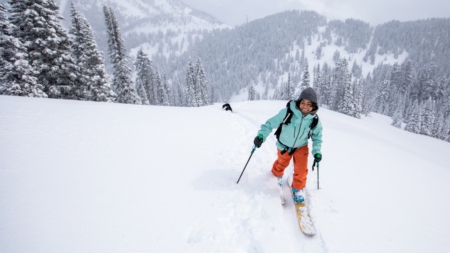Coming Home
For three women of color in Wyoming, going into the mountains isn’t about representation—it’s about reclaiming their power, together.
More or less, we are all in pursuit of proof that we are worthy. That primordial sense of belonging; a desire tied to our innate drive to whittle meaning out of the expanse. Though the effort required to unearth proof is not equal.
As women of color in a predominantly white mountain town, we often struggle to be seen and elevated beyond our exterior. When we are elevated, it comes with a tinge of unworthiness because of our own embedded privileges and the odds that positioned us to be here.
Dawn in the mountains is a special kind of peace.
The sky, a patchwork of pink and purple hues, drapes the surrounding slopes in soft pastels. The morning air is crisp, penetrating and refreshing, the kind that energizes, as though you spent a night out among the pines.
The sun stokes our backs, lubricating our bodies as we move through the backcountry order of operations. We boot up and stretch open our reluctant skins to meet their respective bases. We close our trunks, hide our keys, saunter over to the trailhead and strap in for the day’s tour.
“Are you beeping?” Sofia asks.
“Yep!” Sheena and I reply.
Sofia Jaramillo and Sheena Dhamsania are two friends, and local women of color, who feel more akin to life rafts in a sea of deeply entrenched mountain-town cultural aesthetics. Though I admit growing up with some sense of comfort in white spaces, I never realized how much I yearned for the oasis of their companionship. Individually, each of us is an anomaly around these parts. Collectively, we’re a damn unicorn.
We are bound together under an umbrella too small to boast the breadth of our experiences. Where you see women of color, we see nuanced kinship, each of us a composite of diverse heritage.
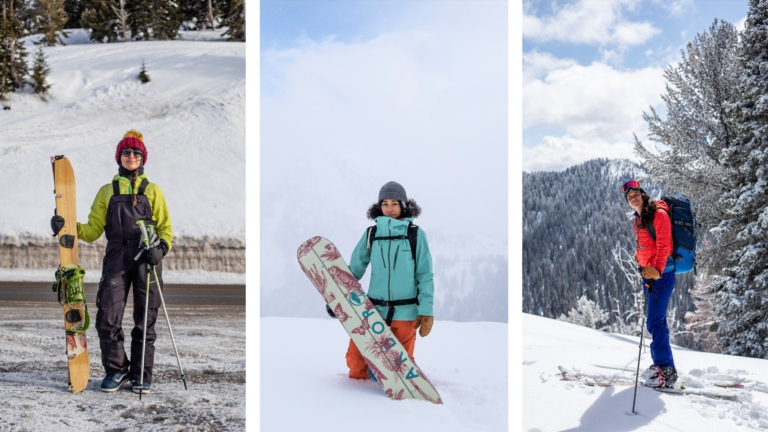
Sheena Dhamsania (left), Emilé Zynobia (middle) and Sofia Jaramillo (right) in their element. The three friends came together recently to support each other’s backcountry pursuits. Jackson, Wyoming. Photos: Sofia Jaramillo and Sheena Dhamsania
Sofia is a mixed-raced Latina, the daughter of a first-generation Colombian and descendent of a pioneer family that migrated west during the time of Manifest Destiny. She straddles the cultures of first-generation immigrants and deeply rooted Idahoan lineage. Raised in Hailey, Idaho, a predominately white town, she never saw herself mirrored in her mountain idols. These days, Sofia moves through the world as a radiant force of energy with an eye for capturing the rich pulp of human experience.
Sheena is the first-generation daughter of East Indian immigrant parents, and a singer and bassist in the local outlaw-country band Risky Livers. She moved to Wyoming sight unseen 10 years ago and fell in love with the mountains. When she’s not dawn patrolling or playing late-night gigs, you’ll find her teaching music at the local elementary school (our very own 2019 Teton County Teacher of the Year).
As for me, Emilé? I, too, ended up here by chance.
Mostly raised between various bicoastal inner cities, I am the biracial product of a brief flame between a Southern woman and a Jamaican man. A serendipitous blend of tragedy and luck brought me to Jackson, Wyoming, at 13 to live with my grandparents, where I was able to get my first taste of life in the mountains and snowboarding. Before then, my exposure to the natural world solely consisted of fantastical imagery projected on TV. As an adult, the natural world in its physical form fascinates me, and now, at 29, I am working toward my graduate degree at the Yale School of Forestry & Environmental Studies, splitting my time between New Haven, Connecticut, and Jackson.
Each of us spans a multiplicity of identities, cultures and worlds. Each of us is obsessed with the sensation of freedom and flight that comes with gliding down a mountain’s snowy cascade.
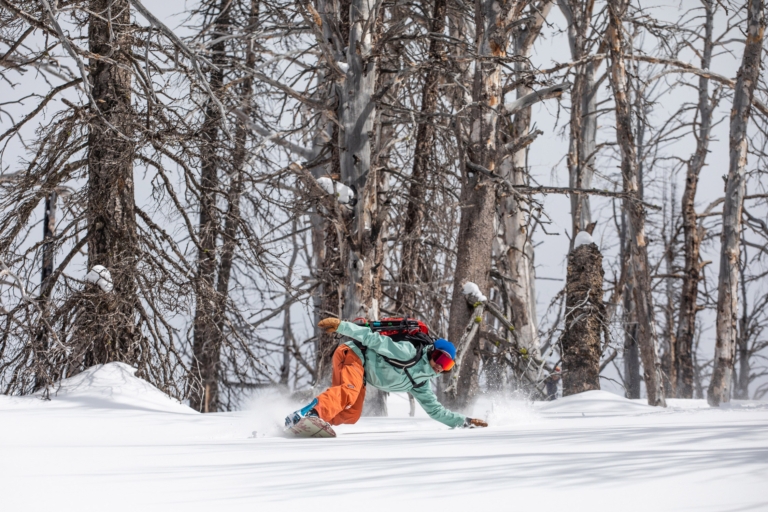
Emilé Zynobia rides out of a small burn zone in the backcountry near Jackson, Wyoming. Photo: Sofia Jaramillo
The morning track glimmers in the dawn light, buffered by banks rounded and refreshed from the previous night’s accumulation. Together, we slide along the skin track and find fleeting moments of synchronicity. From behind, I watch as the tongues of their skins rattle with each forward glide. We move through the mountains together, in defiance of the many barriers to entry for women like us.
“What do you think about that line?” Sofia asks.
“It’s been my dream to ride through a burn, should we go there?” I say.
“Let’s check it out!” Sheena chirps.
Along the skin track, we discuss growing up “brown” and our stories of living in mountain towns. In conversation, we unpack moments where we felt alienated, tokenized and otherized. It strikes me how often we struggle to find the words to explain and process our own experiences. The invisibility of our unique struggles. As women of color, we are often put in situations where we must represent an entire race and gender. A tiresome implicit and explicit pressure to be exceptional in every facet of life. A double-edged sword that adds gas to our ambitious nature and is further reinforced and internalized in moments where our abilities and judgments are doubted. But when we are together, that baggage falls by the wayside, along with our need to perform. Together, we live into what it means to be equals.
In the midst of the burn, we stand awestruck.
Three dwarfs among a graveyard of giants, the charred remains of ancient forest curls around us in a kaleidoscope of swirled grey, beige and black. These totems stand proud, erect in memory of what once was, a reminder of our place in the natural order of things.
Sofia, in sheer electrified creativity, props herself high onto two burned snags to line up a shot. “Hey, Em, you think you can make a few turns through here?”
“Sure thing!”
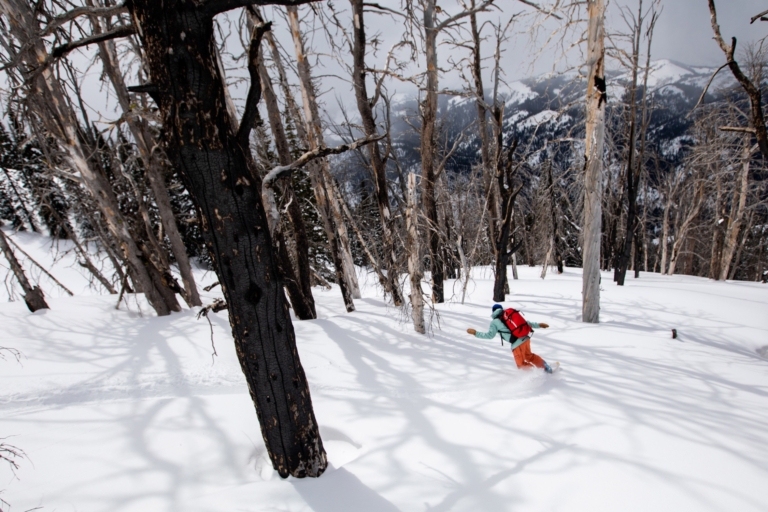
Emilé Zynobia glides through an eerie, yet beautiful burned area near Jackson, Wyoming. Photo: Sofia Jaramillo
When we are out here together making decisions and navigating terrain, our time in the mountains becomes more nourishing and generative. As the moments wax, each of us distills to our more essential, unguarded selves. Among each other, we discover a space in which we can simply be. We don’t have to think about “code-switching” or about whether we are too much or not enough. The mountains become our own temples of empowerment, places where we get to directly lead and find fulfillment in the exercise and practice of our utility. Where we, as women of color, can come alive to the proof of our own power.
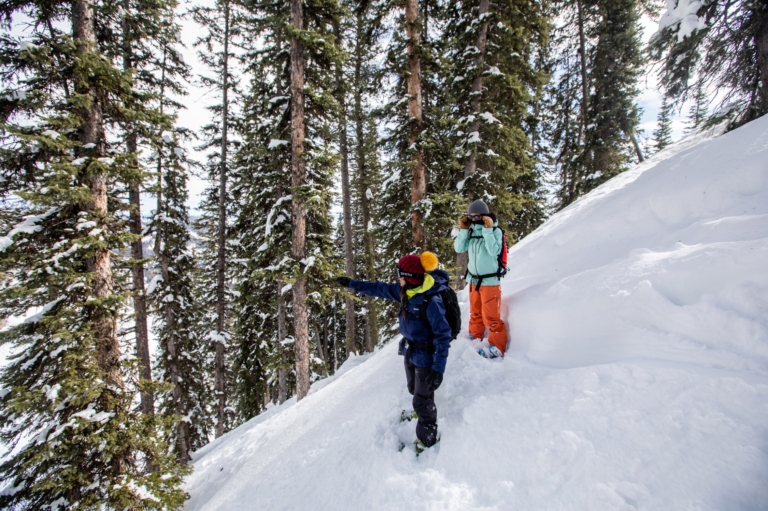
Sheena Dhamsania points out a jump while showing Emilé Zynobia a hidden line. Wyoming. Photo: Sofia Jaramillo
Ecstatic, we make our way down as the burn rolls out before us and transitions to living forest. Drainages and creeks always serve to test your exit strategy. We contour the drainage in search of an adequate snow bridge to cross. We laugh as we haphazardly work to stay out of the creek and upright on the skin track. We simultaneously grasp for and push willows out of our way. Attempting to avoid a thicket, I aim high on the slope and instead end up in the middle of it. Classic.
I glance down and shriek gleefully; a moose paddle partially crusted over with ice. I yell for Sheena and Sofia to stop as I reach down to hoist it up. The paddle’s weight above my head reorients my relationship to gravity.
We laugh, bright-eyed with astonishment in the wake of such an unlikely accident. How we get lost and find ourselves in the process.
“Do you mind if I search for the other one?” I pull my shovel out of my pack and start digging around.
“Em, you look like a kid in a sandbox!” Sofia chuckles.
“Like the essence of yourself,” Sheena adds.
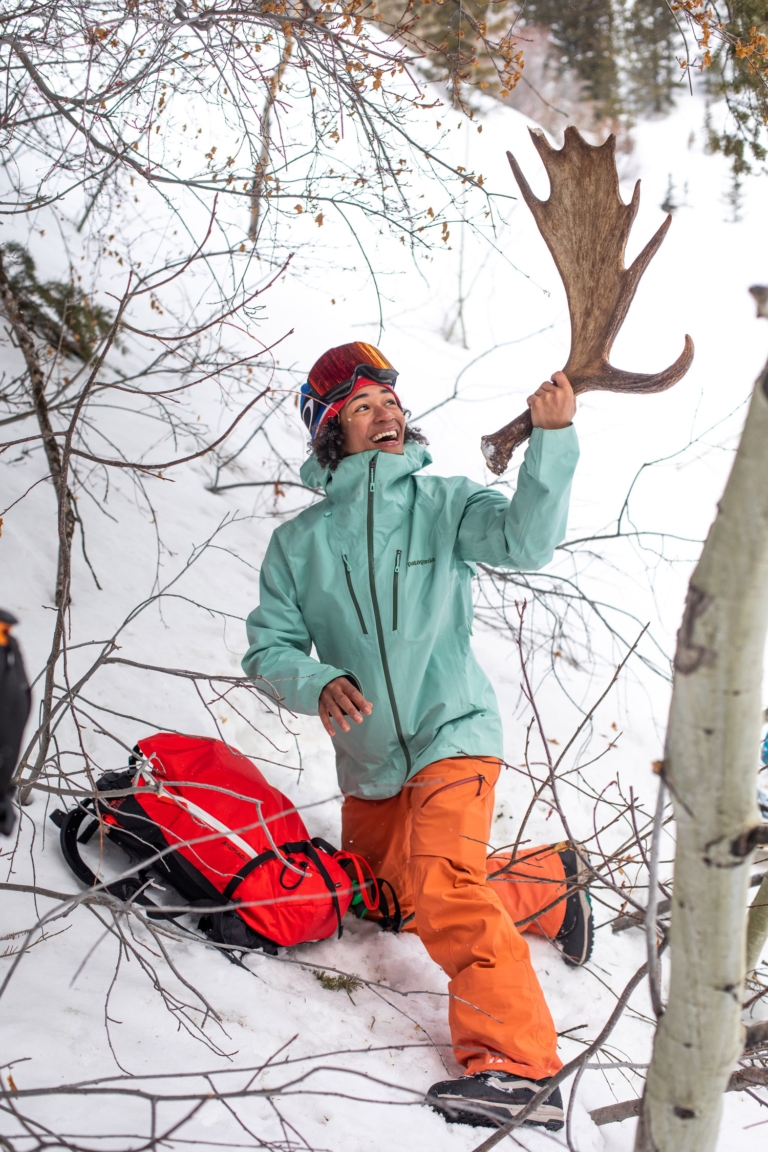
The author stumbles upon a rare find. Photo: Sofia Jaramillo
Often I ask myself, who is “diversity” for? Representation is great but not enough. Representation as it is pursued now—which tends to focus on the elevation of a few individuals to perform the undue labor of both token and diversity expert—misses the point. It is not enough to place people who appear different from you in catalogs and on team rosters. We need the collective outdoor community to do the work of becoming better informed to craft more meaningful solutions. And that begins with you. At times in these spaces, approaches to diversity and inclusion are superficial, operating as a means to access altruistic feelings rather than focusing on the very real systemic marginalization that excludes people from these spaces.
As human beings, the solace and grounding natural spaces provide are our birthright. While representation can shift perceptions and inspire, it doesn’t equate to improved accessibility without the means, the support and the community to fulfill the promise of these places. Sheena, Sofia and I have access to these generative backcountry experiences not only as a consequence of overcoming the odds to find one other, but also due to our unique proximities to whiteness and the privileges that allowed us to access these spaces.
Together, we are witnessed, able to grow and expand without judgment. Not all group dynamics are created equal. It’s a unique and humbling tension; that is to say, we don’t always have it all figured out.
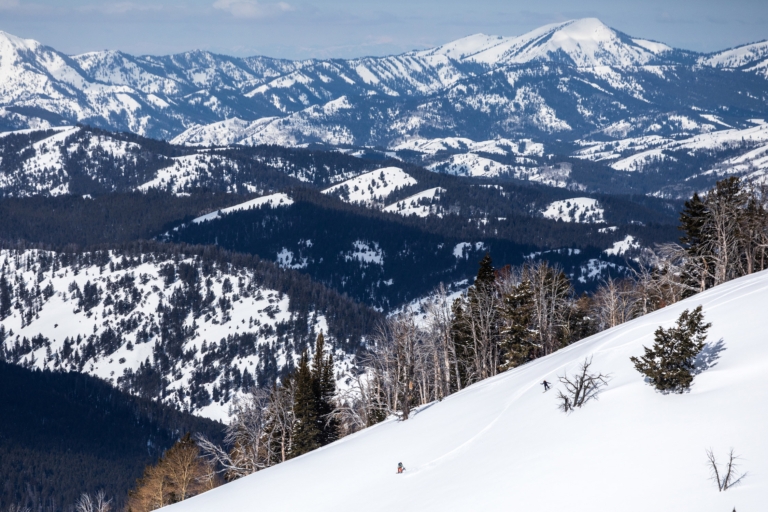
Emilé Zynobia (left) and Sheena Dhamsania take a ride towards Idaho. Wyoming. Photo: Sofia Jaramillo
Being in the mountains can be an enormously beautiful and transcendent experience for every human. Snowboarding and skiing are fun and pleasurable, and free us from the familiar physics of our bodily movements. In the end, we do not go into the mountains to represent; we go into the mountains to come home to ourselves.
